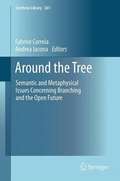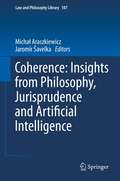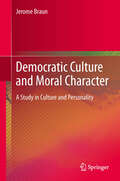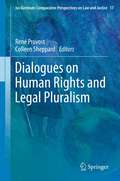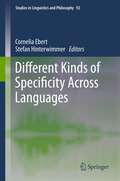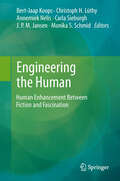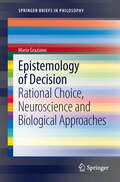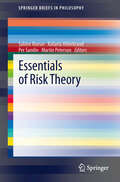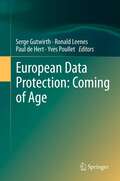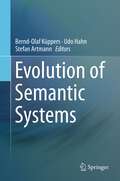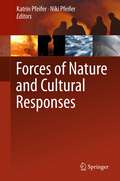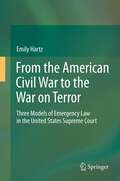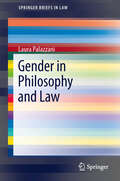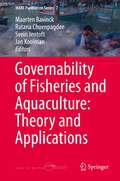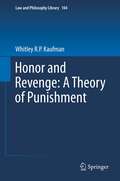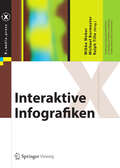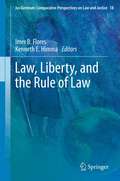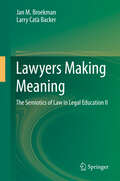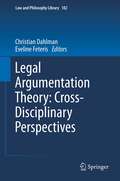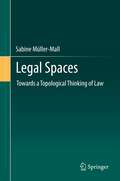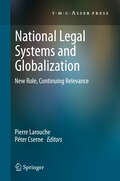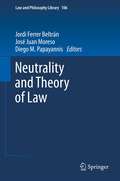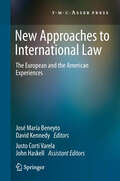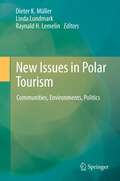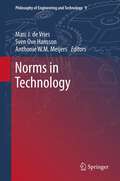- Table View
- List View
Around the Tree: Semantic and Metaphysical Issues Concerning Branching and the Open Future (Synthese Library #361)
by Fabrice Correia Andrea IaconaOver the past few years, the tree model of time has been widely employed to deal with issues concerning the semantics of tensed discourse. The thought that has motivated its adoption is that the most plausible way to make sense of indeterminism is to conceive of future possibilities as branches that depart from a common trunk, constituted by the past and the present. However, the thought still needs to be further articulated and defended, and several important questions remain open, such as the question of how actuality can be understood and formally represented in a branching framework. The present volume is intended to be a 360 degree reflection on the tree model. The contributions is gathers concern the model and its alternatives, both from a semantic and from a metaphysical point of view.
Coherence: Insights From Philosophy, Jurisprudence And Artificial Intelligence (Law and Philosophy Library #107)
by Michał Araszkiewicz Jaromír ŠavelkaThis book is a thorough treatise concerned with coherence and its significance in legal reasoning. The individual chapters present the topic from the general philosophical perspective, the perspective of legal-theory as well as the viewpoint of cognitive sciences and the research on artificial intelligence and law. As it has turned out the interchange of knowledge among these disciplines is very fruitful for each of them, providing mutual inspiration and increasing understanding of a given topic. This book is a unique resource for anyone interested in the concept of coherence and the role it plays in reasoning. As this book captures important contemporary issues concerning the ongoing discussion on coherence and law, those interested in legal reasoning should find it particularly helpful. By presenting such a broad scope of views and methods on approaching the issue of coherence we hope to promote the general interest in the topic as well as the academic research that centers around coherence and law.
Democratic Culture and Moral Character
by Jerome BraunThis book returns critical theory to its roots in both psychology and the social sciences. It shows some of the relationships between equality in a political and social sense and personal identity that either relates well to such equality, or rebels against it. All this reflects processes of social and cultural influence that involve not only random change but also processes of social and cultural evolution that themselves have effects regarding potentials for self-fulfillment and even public morality. This book provides a framework to help one study the interaction between individual aspirations and social opportunities. Jerome Braun, known for his writings in interdisciplinary social science, an approach he calls pragmatic critical theory, here provides a book that discusses issues relevant to the moral underpinnings of democratic society, including issues of social evolution and of culture and personality. This book will be of particular interest to scholars and students of Psychology (particularly in the areas of Psychology of Personality and Cultural Psychology), Sociology (especially those interested in Sociology of Alienation and Sociology of Culture, as well as Sociology of Mental Health), Anthropology (particularly in the area of Psychological Anthropology), Cultural Studies, and Social Theory in general.
Dialogues on Human Rights and Legal Pluralism
by Colleen Sheppard René ProvostHuman rights have transformed the way in which we conceive the place of the individual within the community and in relation to the state in a vast array of disciplines, including law, philosophy, politics, sociology, geography. The published output on human rights over the last five decades has been enormous, but has remained tightly bound to a notion of human rights as dialectically linking the individual and the state. Because of human rights' dogged focus on the state and its actions, they have very seldom attracted the attention of legal pluralists. Indeed, some may have viewed the two as simply incompatible or relating to wholly distinct phenomena. This collection of essays is the first to bring together authors with established track records in the fields of legal pluralism and human rights, to explore the ways in which these concepts can be mutually reinforcing, delegitimizing, or competing. The essays reveal that there is no facile conclusion to reach but that the question opens avenues which are likely to be mined for years to come by those interested in how human rights can affect the behaviour of individuals and institutions.
Different Kinds of Specificity Across Languages
by Cornelia Ebert Stefan HinterwimmerThis anthology of papers analyzes a range of specificity markers found in natural languages. It reflects the fact that despite intensive research into these markers, the vast differences between the markers across languages and even within single languages have been less acknowledged. Commonly regarded specific indefinites are by no means a homogenous class, and so this volume fills a gap in our understanding of the semantics and pragmatics of indefinites. The papers explore differences and similarities among these specificity markers, concentrating on the following issues: whether specificity is a purely semantic or also a pragmatic notion; whether the contribution of specificity markers is located on the level of the at-issue content; whether some kind of speaker-listener asymmetry concerning the identification of the referent is involved; and the behavioral scope of these indefinites in the context of other quantifiers, negation, attitude verbs, and intensional/modal operators.
Engineering the Human
by Monika S. Schmid Carla Sieburgh Bert Jaap Koops J.P.M. Jansen Annemiek Nelis Christoph H. LüthyThe volume is collection of articles treating the topic of human improvement/enhancement from a variety of perspectives - philosophical, literary, medical, genetic, sociological, legal etc. The chapters in this volume treat not only those aspects that most immediately come to mind when one thinks of 'human enhancement', such as genetic engineering, cloning, artificial implants and artificial intelligence etc. Somewhat less obvious aspects include evolutionary perspectives in connection with the prolongation of the human lifespan, plastic surgery since its beginnings, and questions such as whether the distinction between 'natural' and 'artificial' can really be drawn at all and how it has been conceived across the ages, or what the legal implications are of recent developments and techniques. Many papers make links to the representation of these developments in popular culture, from Jules Verne through Aldous Huxley to the movie Gattaca, address the hopes and fears that come with them as well as the question how realistic these are. While all chapters are written by scientists at the international top of their respective fields, all are accessible to a non-specialist audience and eminently readable. We believe that they represent a state-of-the art overview of questions that are of interest to a large audience. The book thus targets a non-specialist audience with an interest in philosophical, sociological, scientific and legal issues involved in both traditional and recent matters concerning the desire of mankind to improve itself, the human body, the human mind and the human condition. It is unique in that it brings together all these aspects within a coherent and cohesive collection.
Epistemology of Decision
by Mario GrazianoThis book carries out an epistemological analysis of the decision, including a critical analysis through the continuous reference to an interdisciplinary approach including a synthesis of philosophical approaches, biology and neuroscience. Besides this it represents the analysis of causality here seen not from the formal point of view, but from the "embodied" point of view.
Essentials of Risk Theory
by Martin Peterson Sabine Roeser Per Sandin Rafaela HillerbrandRisk has become one of the main topics in fields as diverse as engineering, medicine and economics, and it is also studied by social scientists, psychologists and legal scholars. This Springer Essentials version offers an overview of the in-depth handbook and highlights some of the main points covered in the Handbook of Risk Theory. The topic of risk also leads to more fundamental questions such as: What is risk? What can decision theory contribute to the analysis of risk? What does the human perception of risk mean for society? How should we judge whether a risk is morally acceptable or not? Over the last couple of decades questions like these have attracted interest from philosophers and other scholars into risk theory. This brief offers the essentials of the handbook provides for an overview into key topics in a major new field of research and addresses a wide range of topics, ranging from decision theory, risk perception to ethics and social implications of risk. It aims to promote communication and information among all those who are interested in theoretical issues concerning risk and uncertainty. The Essentials of Risk Theory brings together internationally leading philosophers and scholars from other disciplines who work on risk theory. The contributions are accessibly written and highly relevant to issues that are studied by risk scholars. The Essentials of Risk Theory will be a helpful starting point for all risk scholars who are interested in broadening and deepening their current perspectives.
European Data Protection: Coming of Age
by Paul De Hert Yves Poullet Serge Gutwirth Ronald LeenesOn 25 January 2012, the European Commission presented its long awaited new "Data protection package". With this proposal for a drastic revision of the data protection framework in Europe, it is fair to say that we are witnessing a rebirth of European data protection, and perhaps, its passage from an impulsive youth to a more mature state. Technology advances rapidly and mobile devices are significantly changing the landscape. Increasingly, we carry powerful, connected, devices, whose location and activities can be monitored by various stakeholders. Very powerful social network sites emerged in the first half of last decade, processing personal data of many millions of users. Updating the regulatory network was imminent and the presentation of the new package will initiate a period of intense debate in which the proposals will be thoroughly commented upon and criticized, and numerous amendments will undoubtedly be proposed. This volume brings together some 19 chapters offering conceptual analyses, highlighting issues, proposing solutions, and discussing practices regarding privacy and data protection. In the first part of the book, conceptual analyses of concepts such as privacy and anonymity are provided. The second section focuses on the contrasted positions of digital natives and ageing users in the information society. The third section provides four chapters on privacy by design, including discussions on roadmapping and concrete techniques. The fourth section is devoted to surveillance and profiling, with illustrations from the domain of smart metering, self-surveillance and the benefits and risks of profiling. The book concludes with case studies pertaining to communicating privacy in organisations, the fate of a data protection supervisor in one of the EU member states and data protection in social network sites and online media. This volume brings together some 19 chapters offering conceptual analyses, highlighting issues, proposing solutions, and discussing practices regarding privacy and data protection. In the first part of the book, conceptual analyses of concepts such as privacy and anonymity are provided. The second section focuses on the contrasted positions of digital natives and ageing users in the information society. The third section provides four chapters on privacy by design, including discussions on roadmapping and concrete techniques. The fourth section is devoted to surveillance and profiling, with illustrations from the domain of smart metering, self-surveillance and the benefits and risks of profiling. The book concludes with case studies pertaining to communicating privacy in organisations, the fate of a data protection supervisor in one of the EU member states and data protection in social network sites and online media.
Evolution of Semantic Systems
by Bernd-Olaf Küppers Stefan Artmann Udo HahnComplex systems in nature and society make use of information for the development of their internal organization and the control of their functional mechanisms. Alongside technical aspects of storing, transmitting and processing information, the various semantic aspects of information, such as meaning, sense, reference and function, play a decisive part in the analysis of such systems. With the aim of fostering a better understanding of semantic systems from an evolutionary and multidisciplinary perspective, this volume collects contributions by philosophers and natural scientists, linguists, information and computer scientists. They do not follow a single research paradigm; rather they shed, in a complementary way, new light upon some of the most important aspects of the evolution of semantic systems. Evolution of Semantic Systems is intended for researchers in philosophy, computer science, and the natural sciences who work on the analysis or development of semantic systems, ontologies, or similar complex information structures. In the eleven chapters, they will find a broad discussion of topics ranging from underlying universal principles to representation and processing aspects to paradigmatic examples.
Forces of Nature and Cultural Responses
by Katrin Pfeifer Niki PfeiferHow do and how did people perceive, manage and respond to natural disasters? How are the causes of natural disasters explained in history, how are they explained today? This volume investigates relationships between forces of nature and human culture in a multidisciplinary context bridging science and the humanities. Forces of nature and cultural responses is divided into four sections: (1) ball lightnings, (2) earthquakes and tsunamis, (3) volcanic eruptions and plagues, and (4) hurricanes and floodings. Specifically, Section 1 investigates theories and case studies of ball lightning phenomena. Section 2 includes a psychological study on the impact of earthquakes on academic performance, a study on tsunami vulnerability and recovery strategies in Thailand and a study on the social and economic aftermaths of a tsunami and a hurricane in Hawaii. Section 3 consists of a chapter on volcanic eruptions and plagues as well as cultural responses in Ancient Times and a study on contemporary vulnerability and resilience under chronic volcanic eruptions. Section 4 investigates the impact of hurricane Katrina on the current jazz scene in New Orleans and cultural responses to floodings in The Netherlands in Early Modern Times.
From the American Civil War to the War on Terror
by Emily HartzThis book offers a systematic and comprehensive account of the key cases that have come to shape the jurisprudence on emergency law in the United States from the Civil War to the War on Terror. The legal questions raised in these cases concern fundamental constitutional issues such as the status of fundamental rights, the role of the court in times of war, and the question of how to interpret constitutional limitations to executive power. At stake in these difficult legal questions is the issue of how to conceive of the very status of law in liberal democratic states. The questions with which the Supreme Court justices have to grapple in these cases are therefore as philosophical as they are legal. In this book the Court's arguments are systematized according to categories informed by constitutional law as well as classic philosophical discussions of the problem of emergency. On this basis, the book singles out three legal paradigms for interpreting the problem of emergency: the rights model, the extra-legal model and the procedural model. This systematic approach helps the reader develop a philosophical and legal overview of central issues in the jurisprudence on emergency.
Gender in Philosophy and Law
by Laura PalazzaniThis book is an introductory systematic framework in the complex and interdisciplinary sex/gender debate, focusing on philosophy of law.The volume analyses the different theories that have dealt with the gender category, highlighting the conceptual premises and the arguments of the most influential theories in the debate, which have had repercussions on the field of the ethical and juridical debate (with reference to intersexuality, transsexualism, transgender, homosexuality). The aim is to offer a sort of conceptual orientation in the complexity of the debate, in an effort to identify the various aspects and development processes of the theories, so as to highlight the conceptual elements of the theorisations to grasp the problem areas within them. It is therefore an overall synthetic and also explicative analysis, but not only explicative: the aim is to outline the arguments supporting the different theories and the counter-arguments too, for the purpose of proposing categories to weigh up the elements and to take one's own critical stance, with a methodological style that is neither descriptive nor prescriptive, but critical.
Governability of Fisheries and Aquaculture: Theory and Applications
by Jan Kooiman Svein Jentoft Ratana Chuenpagdee Maarten BavinckFollowing from Fish for Life - Interactive Governance for Fisheries (Kooiman et al., 2005), which presents an interdisciplinary and intersectoral approach to the governance of capture and aquaculture fisheries, this volume pursues what interactive governance theory and the governability perspective contribute to the resolution of key fisheries problems, these include overfishing, unemployment and poverty, food insecurity, and social injustice. Since these problems are varied and can be felt among governments, resource users and communities globally, the diagnosis must be holistic, and take account of principles, institutions, and operational conditions. The authors argue that 'wicked problems' and institutional limitations are inherent to each setting, and must be included in the analysis. The volume thereby offers a new lens and a systematic approach for analysing the nature of problems and challenges concerning the governance of fisheries, explores where these problems are situated, and how potential solutions may be found. "It now seems clear that the crisis in the world's fisheries [is] a much larger and more complex problem than many had imagined. Yet, examining it through the lens of governability may offer the best hope for alleviating it--as well as alleviating similar crises in other social systems." James R. McGoodwin (Professor Emeritus, University of Colorado)
Honor and Revenge: A Theory of Punishment
by Whitley R.P. KaufmanThis book addresses the problem of justifying the institution of criminal punishment. It examines the "paradox of retribution": the fact that we cannot seem to reject the intuition that punishment is morally required, and yet we cannot (even after two thousand years of philosophical debate) find a morally legitimate basis for inflicting harm on wrongdoers. The book comes at a time when a new "abolitionist" movement has arisen, a movement that argues that we should give up the search for justification and accept that punishment is morally unjustifiable and should be discontinued immediately. This book, however, proposes a new approach to the retributive theory of punishment, arguing that it should be understood in its traditional formulation that has been long forgotten or dismissed: that punishment is essentially a defense of the honor of the victim. Properly understood, this can give us the possibility of a legitimate moral justification for the institution of punishment.
Interaktive Infografiken
by Michael Burmester Ralph Tille Wibke WeberIn einer Welt der Multimedialität gewinnt ein Visualisierungstyp zunehmend an Bedeutung: die interaktive Infografik. Sie wird im Journalismus ebenso eingesetzt wie in der Unternehmenskommunikation. Dieses Buch führt auf Grundlage aktueller Forschungserkenntnisse in Theorie, Design und Rezeption von interaktiven Infografiken ein: Wie werden sie wahrgenommen? Welche Vorteile bieten sie für das Verstehen und Behalten von Inhalten? Gibt es Gestaltungs- und Erzählmuster? Welche Methoden wenden Infografiker an? Mit Beispielen und Tipps von Experten.
Law, Liberty, and the Rule of Law
by Imer B. Flores Kenneth E. HimmaIn recent years, there has been a substantial increase in concern for the rule of law. Not only have there been a multitude of articles and books on the essence, nature, scope and limitation of the law, but citizens, elected officials, law enforcement officers and the judiciary have all been actively engaged in this debate. Thus, the concept of the rule of law is as multifaceted and contested as it's ever been, and this book explores the essence of that concept, including its core principles, its rules, and the necessity of defining, or even redefining, the basic concept. Law, Liberty, and the Rule of Law offers timely and unique insights on numerous themes relevant to the rule of law. It discusses in detail the proper scope and limitations of adjudication and legislation, including the challenges not only of limiting legislative and executive power via judicial review but also of restraining active judicial lawmaking while simultaneously guaranteeing an independent judiciary interested in maintaining a balance of power. It also addresses the relationship not only between the rule of law, human rights and separation of powers but also the rule of law, constitutionalism and democracy.
Lawyers Making Meaning....
by Jan M. Broekman Larry Catà BackerThis book present a structure for understanding and exploring the semiotic character of law and law systems. Cultivating a deep understanding for the ways in which lawyers make meaning--the way in which they help make the world and are made, in turn by the world they create --can provide a basis for consciously engaging in the work of the law and in the production of meaning. The book first introduces the reader to the idea of semiotics in general and legal semiotics in particular, as well as to the major actors and shapers of the field, and to the heart of the matter: signs. The second part studies the development of the strains of thinking that together now define semiotics, with attention being paid to the pragmatics, psychology and language of legal semiotics. A third part examines the link between legal theory and semiotics, the practice of law, the critical legal studies movement in the USA, the semiotics of politics and structuralism. The last part of the book ties the different strands of legal semiotics together, and closely looks at semiotics in the lawyer's toolkit--such as: text, name and meaning.
Legal Argumentation Theory: Cross-Disciplinary Perspectives
by Christian Dahlman Eveline FeterisThis book offers its readers an overview of recent developments in the theory of legal argumentation written by representatives from various disciplines, including argumentation theory, philosophy of law, logic and artificial intelligence. It presents an overview of contributions representative of different academic and legal cultures, and different continents and countries. The book contains contributions on strategic maneuvering, argumentum ad absurdum, argumentum ad hominem, consequentialist argumentation, weighing and balancing, the relation between legal argumentation and truth, the distinction between the context of discovery and context of justification, and the role of constitutive and regulative rules in legal argumentation. It is based on a selection of papers that were presented in the special workshop on Legal Argumentation organized at the 25th IVR World Congress for Philosophy of Law and Social Philosophy held 15-20 August 2011 in Frankfurt, Germany.
Legal Spaces
by Sabine Müller-MallThis book is concerned with a central question in contemporary legal theory: how to describe global law? In addressing this question, the book brings together two features that are different and yet connected to one another: the conceptual description of contemporary law on the one hand, and methods of taking concrete perspectives on law on the other hand. The book provides a useful concept for describing global law: thinking of law spatially. It illustrates that space is a concept with the capacity to capture the relationality, dynamics, and hybridity of law. Moreover, this book investigates the role of topological thinking in finding concrete perspectives on law. Legal Spaces offers an innovative and interdisciplinary approach to law.
National Legal Systems and Globalization
by Pierre Larouche Péter CserneThis book presents the results of research project financed by the Hague Institute for the Internationalization of Law (HiiL) and carried out at the Tilburg Law and Economics Center (TILEC) of Tilburg University. The project team shows that globalization, instead of threatening national legal systems, put them in a new role and gives them continuing relevance. First of all, once one takes a more functional view of the law, based on law and economics and comparative law literature, harmonization or unification of national legal systems is no longer a foregone conclusion. Secondly, fundamental constitutional principles continue to bear in the era of multi-level and transnational governance: they become governance principles, divorced from specific institutional settings. Finally, looking beyond regulatory competition and comparative law, legal emulation provides a rich and fruitful model to explain the interplay between legal systems. This book explores these three themes, both at a theoretical level and in the light of specific examples.
Neutrality and Theory of Law
by Diego M. Papayannis Jordi Ferrer Beltrán José Juan MoresoThis book brings together twelve of the most important legal philosophers in the Anglo-American and Civil Law traditions. The book is a collection of the papers these philosophers presented at the Conference on Neutrality and Theory of Law, held at the University of Girona, in May 2010. The central question that the conference and this collection seek to answer is: Can a theory of law be neutral? The book covers most of the main jurisprudential debates. It presents an overall discussion of the connection between law and morals, and the possibility of determining the content of law without appealing to any normative argument. It examines the type of project currently being held by jurisprudential scholarship. It studies the different approaches to theorizing about the nature or concept of law, the role of conceptual analysis and the essential features of law. Moreover, it sheds some light on what can be learned from studying the non-essential features of law. Finally, it analyzes the nature of legal statements and their truth values. This book takes the reader a step further to understanding law.
New Approaches to International Law
by David Kennedy John Haskell José María Beneyto Justo Corti VarelaThis volume offers a unique reflection on the historic and contemporary influence of the New Approaches to International Law (NAIL) movement within the context of Europe and America. In particular, the contributions focus on the intellectual product of NAIL's founder, David Kennedy, in relation to three legal streams: human rights, legal history, and the law of war. On the one hand, the volume is valuable reading for a broad audience interested in the current challenges facing global governance, and how critical studies might contribute to innovative intellectual and practice-oriented developments in international law. On the other hand, stemming from a 2010 seminar in Madrid that brought together scholars to discuss David Kennedy's scholarship over the last three decades, the contributions here are a testament to the community and ideas of the NAIL tradition. The volume includes scholars from a wide field of legal interests and backgrounds.
New Issues in Polar Tourism
by Dieter K. Müller Linda Lundmark Raynald H. LemelinNew Issues in Polar Tourism traces and analyzes a decade of growing interest in the polar regions, and the consequent challenges and opportunities of increasing tourist traffic in formerly remote and seldom-visited places. The book arises from the recently-formed International Polar Tourism Research Network (IPTRN), and documents the outcomes of its 2010 conference, held at Sweden's Abisko Scientific Research Station.
Norms in Technology
by Sven Ove Hansson Anthonie W.M. Meijers Marc J VriesThis book is a distinctive fusion of philosophy and technology, delineating the normative landscape that informs today's technologies and tomorrow's inventions. The authors examine what we deem to be the internal norms that govern our ever-expanding technical universe. Recognizing that developments in technology and engineering literally create our human future, transforming existing knowledge into tomorrow's tools and infrastructure, they chart the normative criteria we use to evaluate novel technological artifacts: how, for example, do we judge a 'good' from a 'bad' expert system or nuclear power plant? As well as these 'functional' norms, and the norms that guide technological knowledge and reasoning, the book examines commonly agreed benchmarks in safety and risk reduction, which play a pivotal role in engineering practice. Informed by the core insight that, in technology and engineering, factual knowledge relating, for example, to the properties of materials or the load-bearing characteristics of differing construction designs is not enough, this analysis follows the often unseen foundations upon which technologies rest--the norms that guide the creative forces shaping the technical landscape to come. The book, a comprehensive survey of these emerging topics in the philosophy of technology, clarifies the role these norms (epistemological, functional, and risk-assessing) play in technological innovation, and the consequences they have for our understanding of technological knowledge.
